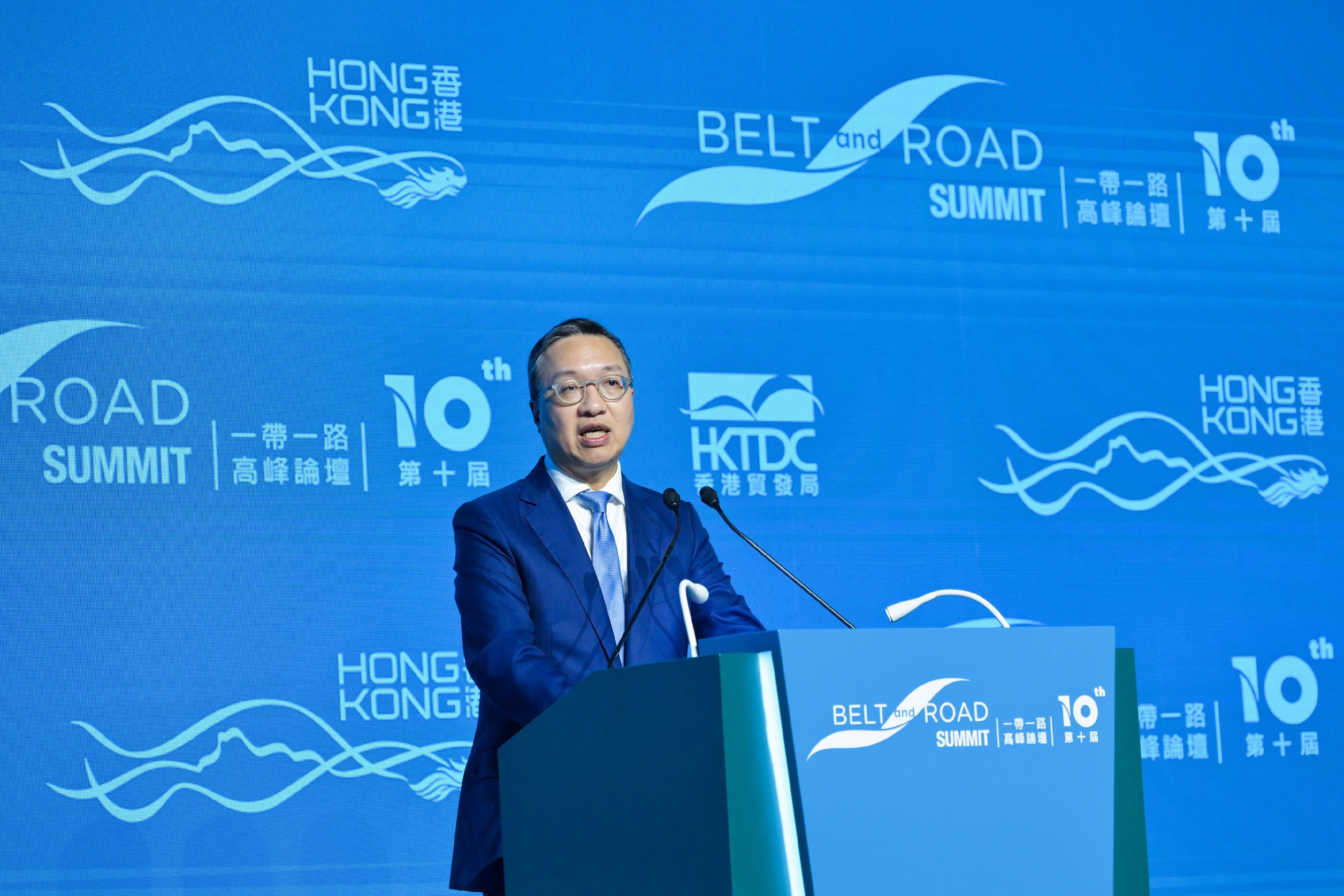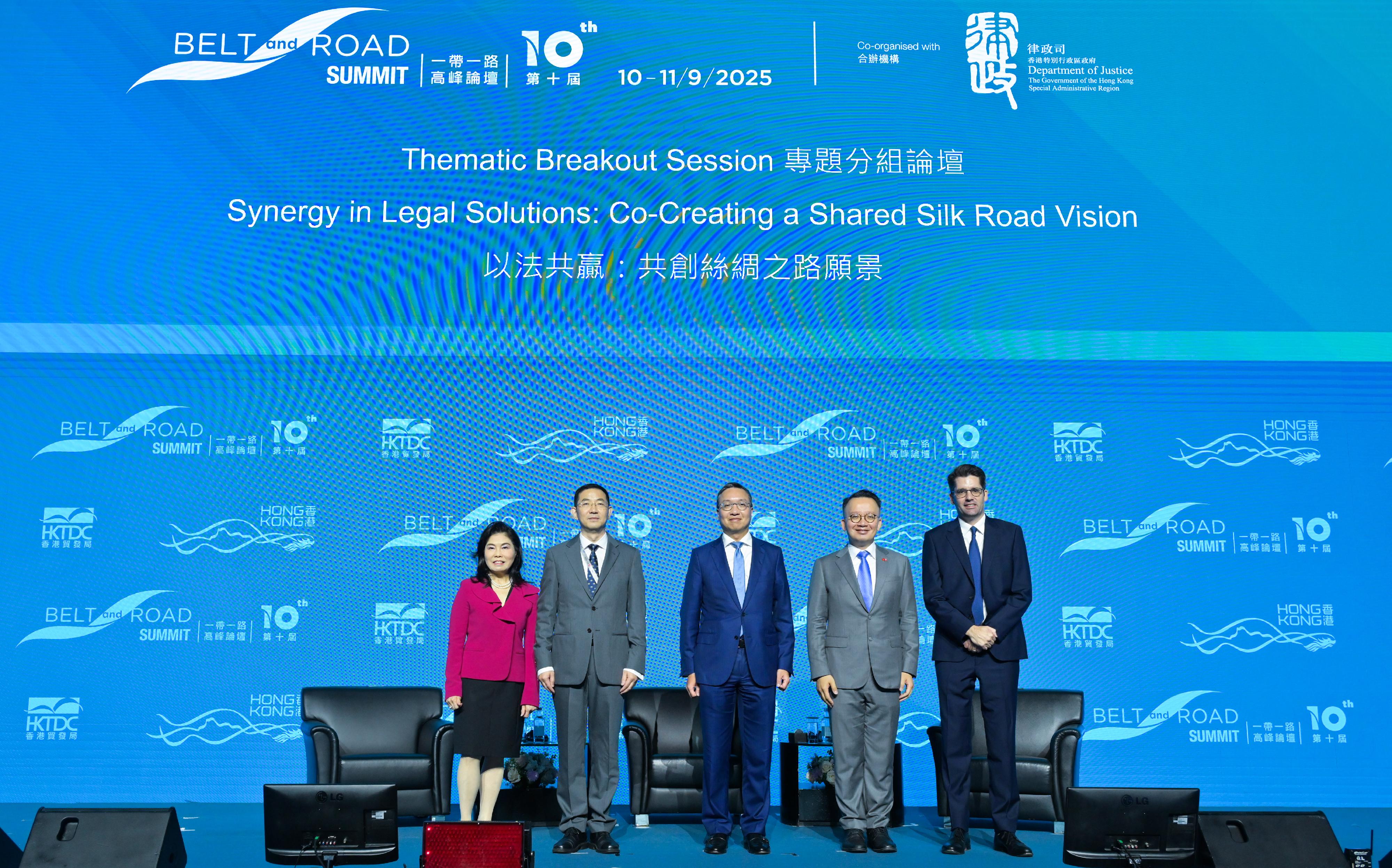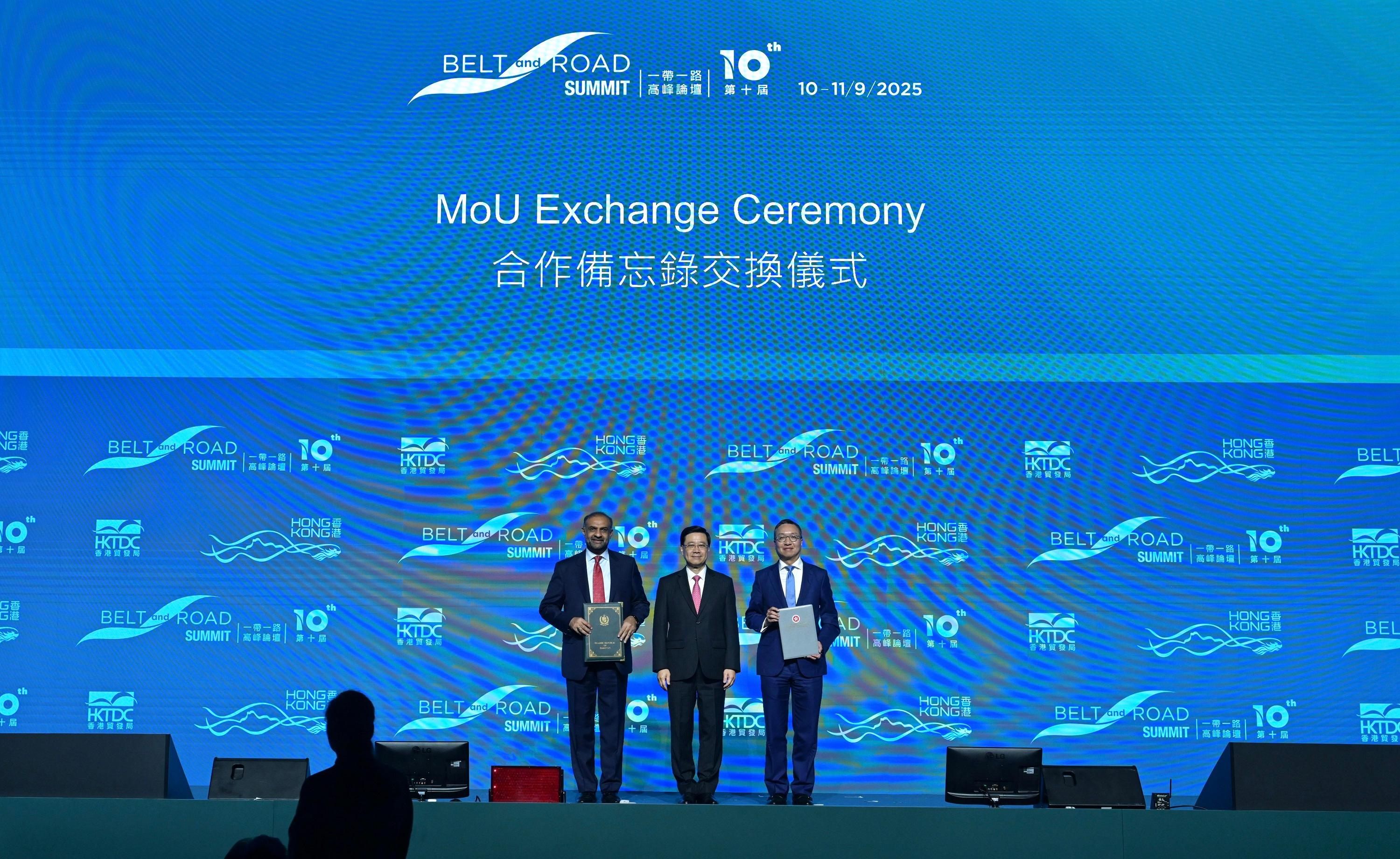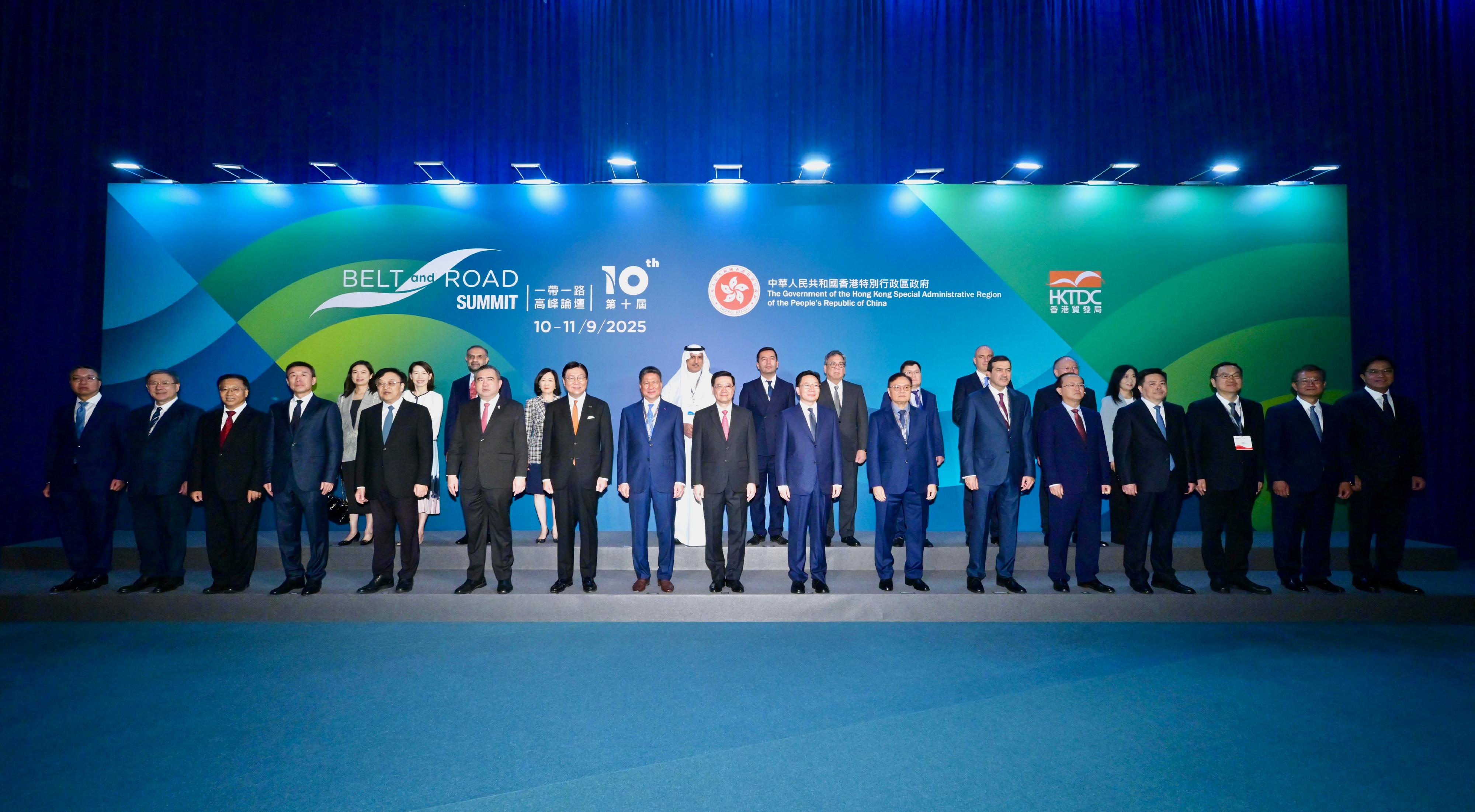Speech by SJ at thematic breakout session of 10th Belt and Road Summit (English only) (with photos)
******************************************************************************************
Distinguished guests, ladies and gentlemen,
Good afternoon. It is my great pleasure to welcome you all to join us in this thematic breakout session, which will focus on the legal and dispute resolution services provided by Hong Kong in the context of the Belt and Road Initiative (B&RI). Before we hear from a distinguished panel of speakers, let me give a brief overview.
Under the fundamental principle of "one country, two systems", Hong Kong enjoys a number of unique systematic strengths. Among other things, one of such strengths is its international, credible and high-quality legal and dispute resolution services based on its common law system against the background that Hong Kong is the only common law jurisdiction in China.
The conclusion and execution of Belt and Road projects, irrespective of their nature, are bound to involve transboundary legal issues. In order to safeguard and promote the parties' interests, and as an essential component of risk management, international legal services are inevitable.
Non-contentious legal services
Let me start with non-contentious legal services, for example, the drafting of contracts and other legal documents, the provision of general legal advices, and the establishment of business entities.
All Belt and Road co-operation agreements would need to be reduced into legally enforceable contracts. When the parties come from different jurisdictions and the execution of the project itself involves different countries, one of the most important primary question is to decide on the governing law of the legal agreement. I would venture to suggest that Hong Kong law provides one of the best options. We have a bilingual legal system under which both Chinese and English are equally authentic. Our common law, in particular, international civil and commercial law and practice, are very familiar to the international business community. In the IMD (International Institute for Management Development) World Competitiveness Yearbook 2025 published in June this year, Hong Kong ranks first in the world in the sub-factor "Business legislation".
One unique characteristic of our common law system is that, while it is separated from the legal system in Mainland, under the principle of "one country, two systems", the HKSAR (Hong Kong Special Administrative Region) and the Mainland have entered into a number of mutual legal assistance arrangements, which would enable overseas parties to explore business opportunities in the Mainland while enjoying the benefits offered by Hong Kong's legal system. For example, these arrangements cover the mutual recognition and enforcement of court judgments in civil and commercial matters, and also arbitral awards.
To take full advantage of the benefits offered by Hong Kong's legal system, it is most advisable to consider setting up business and corporate vehicles in Hong Kong for the purpose of executing co-operation or joint-venture agreements under the B&RI. The most obvious and important advantage is that Hong Kong entities would be entitled to all the tax benefits under Hong Kong law. In the IMD World Competitiveness Yearbook 2025 which I mentioned a moment ago, Hong Kong also ranks first in the sub-factor "Tax policy". And, of course, Hong Kong corporate vehicles may be conveniently used to raise finance and capital to fund Belt and Road projects in Hong Kong, which is one of the most important international financial centres in the world. There are also other privileges which are only available to Hong Kong enterprises. Let me give you one example: since mid-February this year, Hong Kong enterprises, including companies with some Hong Kong interests irrespective of the extent thereof, in the major cities of the Greater Bay Area in Guangdong Province, now enjoy the option to choose Hong Kong law as the governing law of their contracts with other Mainland enterprises, and to choose Hong Kong as the seat of arbitration for resolving disputes.
It is indisputable that Hong Kong has an abundant supply of legal professionals who are highly regarded by the international community. With rich experience and strong expertise in international business, commercial, financial and investment law, our legal professionals serve as "global" lawyers in the sense that, apart from providing legal services related to Hong Kong law, they are able to advise and provide services on legal issues involving other jurisdictions in the light of their good and extensive connections with other jurisdictions. Currently, 280 law firms in Hong Kong have overseas offices, 85 have representative offices in the Mainland; there are 27 registered associations of firms formed jointly by local and foreign laws, 85 foreign law firms and more than 1 600 foreign lawyers.
Dispute resolution services
Let me now move on to dispute resolution services. The starting point is that, under the principle of "one country, two systems", our Judiciary enjoys the independent power of adjudication including that of final adjudication. In our highest court, namely the Court of Final Appeal, apart from local judges, eminent judges from other common law jurisdictions such as the UK (United Kingdom), Australia and New Zealand have been invited to sit as foreign non-permanent judges to ensure that our common law jurisprudence will be of the highest quality and meet the expectations of the international community.
Turning to other modes of dispute resolution, Hong Kong is well regarded as one of the top international arbitration centres. According to the 2025 International Arbitration Survey conducted by Queen Mary University of London, Hong Kong ranks as the second most preferred seat for arbitration globally and the first in the Asia-Pacific region. In 2024, 76.4 per cent of the arbitrations submitted to the Hong Kong International Arbitration Centre (HKIAC) were international in nature. B&RI countries and jurisdictions account for the majority of the geographical origins or nationalities of arbitrators appointed, as well as parties participating in HKIAC arbitrations. Our Judiciary is also renowned for its strong pro-arbitration stance.
It is impossible not to mention mediation. The establishment of the International Organization for Mediation (IOMed) is an important supplement to the current international dispute settlement regime, marking a milestone in promoting the settlement of international disputes, which include disputes between a government and foreign nationals and also international commercial disputes, through mediation. The Signing Ceremony of the Convention on the Establishment of the IOMed was held in Hong Kong on May 30, 2025. Up to date, 36 countries, including China, have signed the Convention, and I believe all of them are B&RI countries. It is noteworthy that the headquarters of the IOMed is situated in Hong Kong; and subject to rules to be made by IOMed, the government and nationals of state parties who have not yet signed or ratified the Convention will also be entitled to use the service of the IOMed.
Capacity building
We also see capacity building as an important component of international legal collaborations. The Department of Justice (DoJ) established the Hong Kong International Legal Talents Training Academy in November 2024. The Academy provides tailor-made training programmes in collaboration with different jurisdictions and international organisations on topics including international law, international arbitration, Hong Kong common law, and so on and so forth.
Collaboration with BR&I countries
The Hong Kong Government is committed to enhancing legal collaborations with Belt and Road countries and the Mainland to assist in the construction of B&RI. The seventh Hong Kong Legal Services Forum was held in Xi'an, a key strategic city in western China under the B&RI, in May this year, and the theme was about cross-border transactions and foreign investment under the B&RI.
Memoranda of Understanding on legal co-operation were signed with the Minister of Justice of Saudi Arabia and the Minister of Commerce of Cambodia in April last year and May this year respectively. I am very pleased that, just this morning, my department also signed a Memorandum of Co-operation with the Ministry of Law and Justice of the Islamic Republic of Pakistan on strengthening co-operation on dispute avoidance and resolution. This Memorandum is the sixth with jurisdictions along the Belt and Road.
Furthermore, since I assumed my present position as the Secretary for Justice, I have organised a number of trips leading a delegation consisting of legal professionals from Hong Kong to visit various Belt and Road countries in the Middle East and South East Asia.
All in all, I firmly believe that Hong Kong will be of great assistance to all friends taking part in Belt and Road projects by providing one-stop legal services covering the whole business cycle of such projects, from inception to fruition. Our international, credible and top-quality legal professionals are ready, willing and able to serve and fight for your best interests.
Looking ahead, the DoJ will continue to use different means to enhance legal co-operations and collaborations with other jurisdictions along the Belt and Road, and to promote and refine our legal and dispute resolution services to ensure that they will meet the expectations and demands of potential and actual users. On this note, I wish you all a constructive and enjoyable session this afternoon. Thank you.
Ends/Wednesday, September 10, 2025
Issued at HKT 16:34
Issued at HKT 16:34
NNNN






